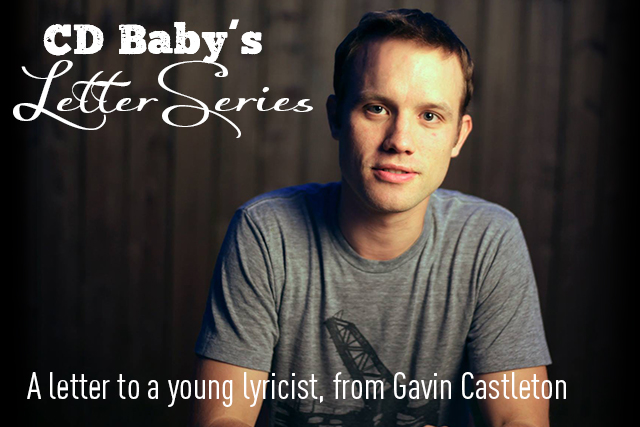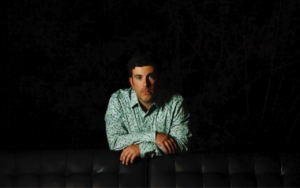[This post, written by Gavin Castleton, is part of a series of letters from established artists (including Gretchen Peters and Mary Gauthier) to young musicians — and it originally appeared on his blog The Great Consolidation. Gavin Castleton is a performing songwriter and music producer whose work spans multiple genres, from pop and rock to R&B and hip hop. He has appeared on Jimmy Fallon and toured the United States extensively.]
Hi Matt,
Thanks for taking an interest in my work! Congrats on your decision to pursue music. As I’m sure you’re aware, it’s a long painful journey with lots of sacrifices but more fulfillment than the average career, I’d bet.
I suspect that my lyrical proclivities are a bit abnormal, so I’m not sure my approach is worth replicating, but I’m happy to tell you my personal philosophy and opinion in regard to prose/lyrics:
1. Read everything. A writer without a thorough grasp of the english language and the myriad of ways brilliant people have been exploiting it for centuries is like a drummer without rudiments… she might hit a few nice pockets, but she won’t have the means to get acrobatic and will work much harder at phrasing than one with a diverse vocabulary and historical knowledge. Watch people like Van Dyke Parks, Joni Mitchell, Leonard Cohen, Tom Waits, and Bob Dylan speak in interviews. It’s not a coincidence that they are some of the greatest lyricists of all time.
2. Listen to everything. Dissect the lyrics that really impact you. Figure out why they were so effective. Early in my development I was impacted by the lyrics of Rufus Wainwright, Joanna Newsom, Perry Farrell, Black Thought, Thom Yorke, Pharaoh Monch, Mos Def, Bjork, MF Doom, etc., but it took me too long to understand why. As someone that wants to increase my lyrical arsenal, it would be wise for me to listen both as an average listener and as a word engineer, and articulate why a phrase impacts me the way it does, so I can apply it to my work.
3. Live through everything. A lyricist is just a journalist in a poet’s jacket. Even fiction writing is based on firsthand experience. Every few years I run out of stories. When that happens, I have to accept that I’ve lost my input/output balance; I’m writing more than I’m experiencing. This is a very common rut for artists, but seldom do they address it for fear of losing momentum. Stop writing, go out and have a breakup, or a car accident, or a crappy job, or a baby, or a protest… to “refill the coffers” with life stories that you can translate and relate to other people. The world doesn’t need more songs about how enjoyable dancing is.
4. Be curious about everything. The most important and effective lyrics are those that tell the listener something they already know, but do so in a way they could not previously articulate. When you do that you are doing the listener a big service, and thereby creating value. Essentially, you are just drawing lines between things that other people had not connected before. This is the essence of good poetry. If I tell you that “love is like a burning flame in the chest” your response is most likely, “Yeah. Thanks for the incredible perspective.” If I tell you that “love is like having a bakery follow you around” you will stop and consider this, and may think, “Huh, it is kind of like that… walking near a bakery lifts my spirits with the smell of comfort. If a bakery were to follow me around, I would constantly feel like that. What a strange but accurate comparison that I had not thought of. Here is my money, GavCaz.”
The way to train yourself to make these connections between disparate experiences easily is to learn about as many different worlds as possible, and take note of everything, especially how an experience makes you feel, so that you can find the parallels and intersections. Be curious about all things and people. Read, read, read. If you get good at it, you shouldn’t have to turn on your poetry cap… it will always be on. The goal is to live poetically. If you achieve that, lyrics will come easily. I’m not there yet, but I’m closer than I was five years ago.
5. Don’t worry about rhyming so much. Rhyming has ruined more lyrics than it’s improved. First learn how to write great poetry, and then worry about making it rhyme. Rhyming is easy when you have a dense vocabulary. Effective messaging is hard. Effective messaging with tasteful rhyming is the final step.
That’s about all I got. Good luck – recognizing that your lyrics are a weak spot already puts you ahead of 98% of the artists out there, so stay at it and keep the long view.
Gavin
—
What do you think makes a great lyric? And a great lyricist? Let us know in the comments below.
[Photo of Gavin taken by Lorna Carman.]
[hana-code-insert name=’newsletter-get-music-promotion’ /]

